Riyadh, Saudi Arabia – International credit rating agency, Standard & Poors (S&P), updated its outlook for Saudi Arabia to positive as the country recovers from the pandemic.
In a statement, issued on Saturday, it assessed the kingdom’s short and long-term foreign and local currency sovereign credit ratings to A-/A-2.
The agency said the positive future outlook reflects the strength of gross domestic product (GDP) growth, the country’s financial policies in the backdrop of its success in recovering from the repercussions of the pandemic, the sustainability of government reform programs and the increasing growth of the non-oil economy.
S&P expects the kingdom’s GDP to grow to its highs in ten years to a ceiling of 7.5 percent in 2022 with an expected financial surplus in the state budget of about 6.3 percent.
S &P also forecasts growth of the Saudi economy product capacity and a drive of the growth in the long run due to efforts of developing the general finances and mega economic reforms.
The agency also forecasts no dramatic rise of sovereign debts costs on the kingdom as most of the public debt portfolio is running at a fixed rate.
The agency described the inflation rates in the kingdom as relatively low in comparison to its counterparts and that those rates would be under control in view of the government subsidizing fuel and food prices in addition to tying the local currency with the relatively-strong US dollar.








